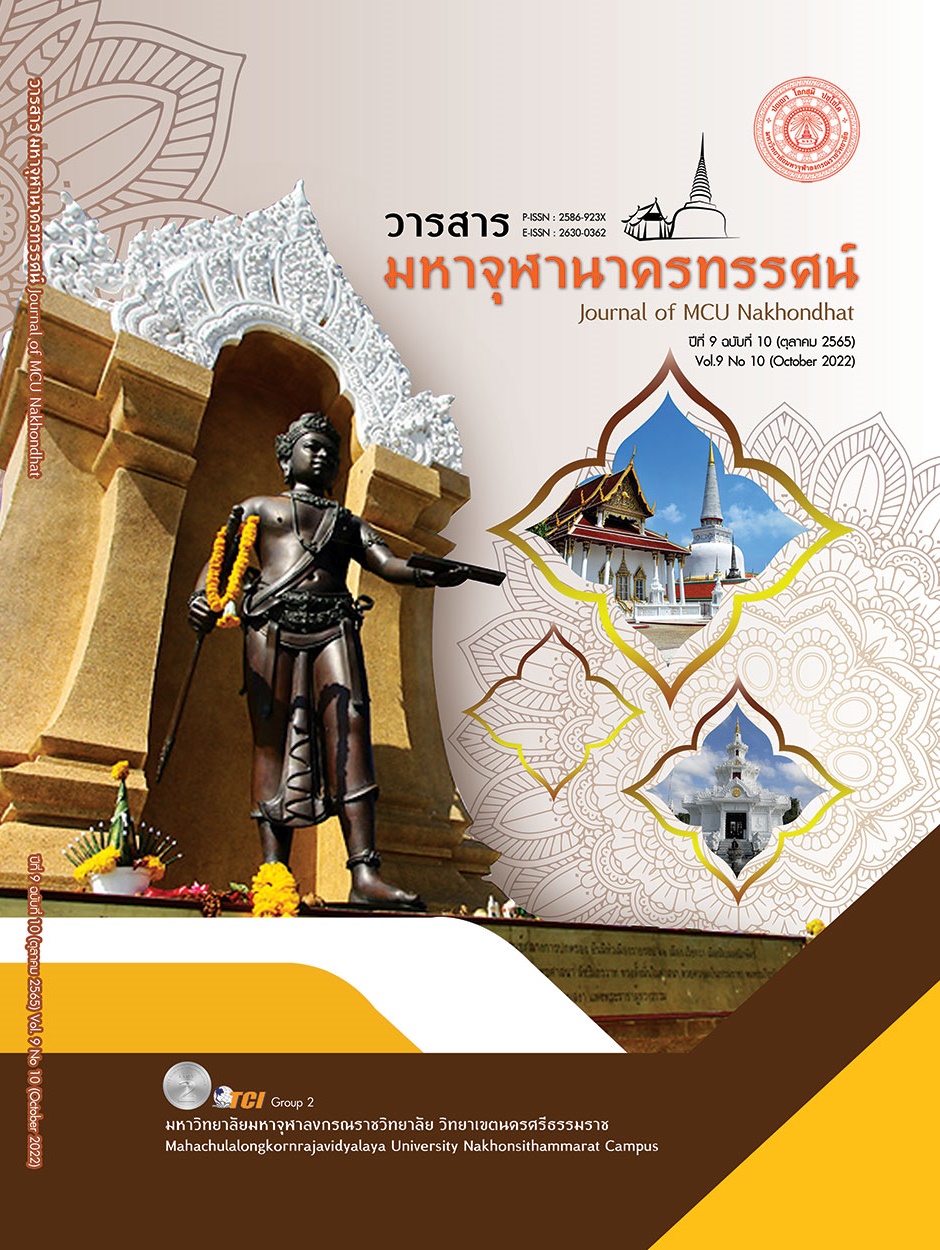DEVELOPMENT OF ETHICAL LEADERSHIP ACCORDING TO BUDDHISM
Main Article Content
Abstract
The academic article consisted of the following objectives: 1) to investigate the development of one’s leadership according to Kusala-kammapatha (10 Wholesome Courses of Action) or Dhammacariyā (Righteous Conduct) with Tisikkhā (the Threefold Learning) and Ariya-Aṭṭhaṅgika - Magga (the Noble Eightfold Path); and2) to explore the guidelines for ethical leadership development according to Buddhism. After synthesizing Kusala-kammapatha with Ariya-Aṭṭhaṅgika-Magga and summarizing in Tisikkhā, a model for developing one's leadership is obtained. After synthesizing Kusala-kammapatha or Dhammacariyā, it is found that both dhammas are in the process of sīla (precepts) and paññā (wisdom). The guidelines for leadership development consist of the following stages: the first stage is to change one's habit or conduct for the better, which must be based on loving-kindness; the second stage is to comprehend the stage of work, management intelligence, punctuality, discipline, and responsibility. Lust, hate, and illusion must not be given power. One must exercise restraint, be patient, be open to other people's rational viewpoints, and be open-minded enough to listen to arguments and criticism from others without resentment or anger; the third stage is to purify the mind by having no prejudice against subordinates and making decisions based on honesty and without Agati (4 prejudices); the fourth stage is to raise awareness, such as unity within the organization; and the fifth stage is to develop values that should be respected and practiced. Positive values should be demonstrated through listening to and learning from someone who has achieved success in their profession.
Article Details

This work is licensed under a Creative Commons Attribution-NonCommercial-NoDerivatives 4.0 International License.
References
กรมวิชาการ กระทรวงศึกษาธิการ. (2511). สํสกฤต-ไทย-อังกฤษ อภิธาน. พระนคร: คุรุสภาลาดพร้าว.
นิพนธ์ กินาวงศ์. (2543). หลักการบริหารการศึกษา. พิษณุโลก: ตระกูลไทย.
พระธรรมปิฎก (ป.อ.ปยุตฺโต). (2546). พุทธธรรม. (พิมพ์ครั้งที่ 11). กรุงเทพมหานคร: โรงพิมพ์ มหาจุฬาลงกรณราชวิทยาลัย.
พระพรหมคุณาภรณ์ (ป.อ.ปยุตฺโต). (2551). การพัฒนาจริยธรรม. (พิมพ์ครั้งที่ 5). กรุงเทพมหานคร: บริษัท พิมพ์สวย จำกัด.
________. (2553). เมตตาทาน การให้ที่มีผลเป็นความสุขอย่างยิ่ง. กรุงเทพมหานคร: ธรรมสภา.
________. (2554). พจนานุกรมพุทธศาสตร์ ฉบับประมวลธรรม. (พิมพ์ครั้งที่ 14). กรุงเทพมหานคร: บริษัท เอส.อาร์. พริ้นติ้ง แมสโปรดักส์ จำกัด.
พระมหาวรชัย ติสฺสเทโว. (2551). พุทธจริยศาสตร์กับวรรณคดี. กรุงเทพมหานคร: มหาวิทยาลัยมหาจุฬาลงกรณราชวิทยาลัย.
วศิน อินทสระ. (2549). พุทธจริยศาสตร. (พิมพครั้งที่ 2). กรุงเทพมหานคร: สำนักพิมพ์ธรรมดา.
สมบัติ จันทรวงศ์, (2550). ทฤษฎีจริยธรรม สรุปการบรรยายรายวิชา รม. 615 จริยธรรมของการเมืองและการบริหาร ภาคเรียนที่ 1/2550. กรุงเทพมหานคร: มหาวิทยาลัยธรรมศาสตร์.
พิพัฒน์ เรืองงาม. (2535). แนวคิดทางรัฐประศาสนศาสตร์ด้านภาวะผู้นำของไทยโบราณ: วิเคราะห์เนื้อหาจากคัมภีร์ราชนิติ. ใน สารนิพนธ์รัฐศาสตรมหาบัณฑิต สาขารัฐศาสตร์. มหาวิทยาลัยธรรมศาสตร์.
พระบาทสมเด็จพระปรมินทรมหาภูมิพลอดุลยเดช รัชกาลที่ 9. (2497). พระบรมราโชวาท ในพิธีพระราชทานปริญญาบัตรของจุฬาลงกรณ์มหาวิทยาลัย ณ หอประชุมจุฬาลงกรณ์มหาวิทยาลัย. เรียกใช้เมื่อ 26 กันยายน 2565, จาก https://atc.onab.go.th/th/content/category/detail/id/114/iid/23046
________. (2500). พระราชดำรัสในพิธีเปิดประชุมรัฐสภา ณ พระที่นั่งอนันตสมาคม. เรียกใช้เมื่อ 26 กันยายน 2565, จาก https://www.thaipost.net/main/detail/29040
________. (2516). พระบรมราโชวาท. เรียกใช้เมื่อ 26 กันยายน 2565 จาก http://thn21579-2.blogspot.com/2012/01/blog-post.html
________. (2522). พระบรมราโชวาท. เรียกใช้เมื่อ วันที่ 26 กันยายน 2565.จาก https://www.thaipost.net/main/detail/29040


